Watching your baby smile in their sleep is very high up on the cuteness scale. If we talk about a new smile of a newborn, it is sometimes known as an angelic smile. And no, it is not surprising that we say that, it is usually expected a long time for a smile.
This magical moment is usually more common when babies are sleeping. Did babies dream? Do they remember their time in the mother’s abdomen? We asked the same questions and asked to know what babies are hiding behind their dreamy smiles. Details in the content of our post 🙂
Babies smile even before they are born
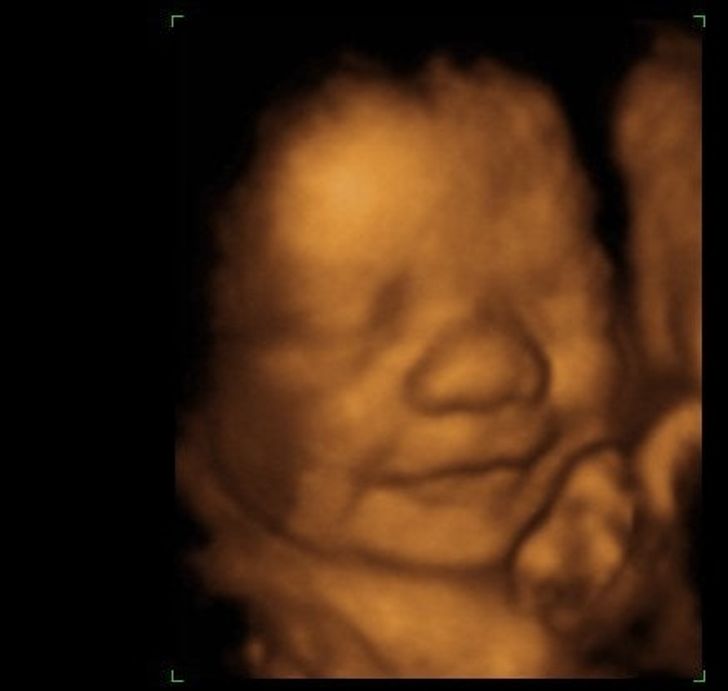
If you were lucky enough to see your baby smiling on an ultrasound, don’t think you were imagining things that weren’t happening. A study that looked at more than 500 pregnant women using 4D ultrasound, found that up to 31 fetuses were actually smiling. All of them smiled for an average time of 3.21 seconds each. In this way, scientists determined that spontaneous smiles occur even when babies are still in the womb, and way prior to their birth.
Now, thanks to the development of new technologies that allow us to peek at babies inside their mother’s womb to see what’s going on in there before birth, it became possible to discover that fetuses can also yawn as early as 18 weeks after they were conceived. Around week 26 of their gestation, they can smile, blink, and even cry from inside the womb — these facial expressions are involuntary reflexes they’re developing as a sort of preparation for the moment of birth.
The first smiles are reflexive and involuntary acts
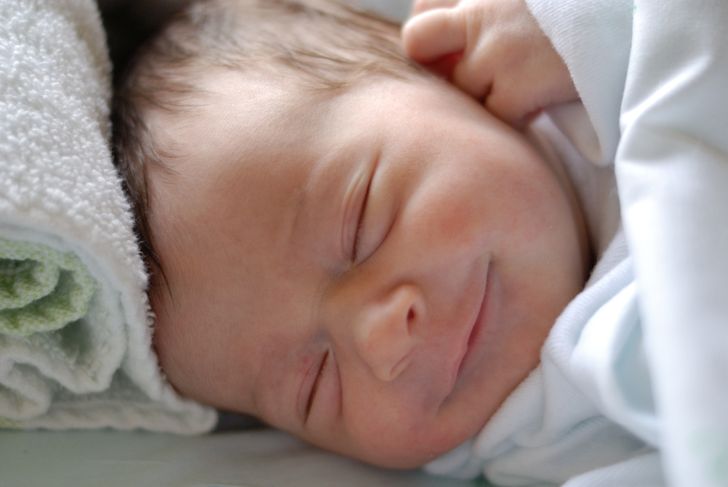
As we mentioned earlier, these actions performed by the baby in the womb are considered to be reflex actions. That is, they are an immediate response to a stimulus, which in the case of babies is usually a feeling of internal well-being. Unlike many of us, it’s very likely that babies are actually not aware that they are smiling so we’re talking about an involuntary movement of their muscles, like when they kick or suck their thumb.
The right time for smiles
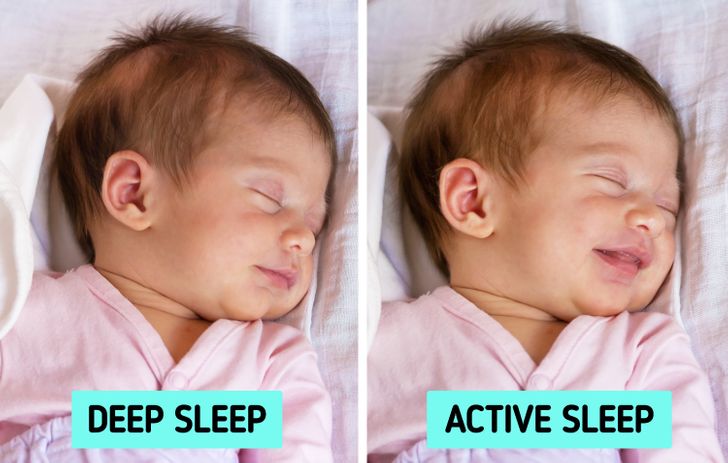
When sleeping, a newborn normally goes through 2 sleep phases: active sleep and deep sleep. The active phase, also known as REM which is an acronym for Rapid Eye Movement, is thought to be produced by intense brain activity. This occurs approximately 60-90 minutes after falling asleep, but sleep works in cycles, so REM will alternate with deep sleep as well. Nevertheless, it’s precisely during REM sleep that we will most likely see our babies smile, grimace, or stretch their legs, as involuntary acts of their body.
Smiling as a response
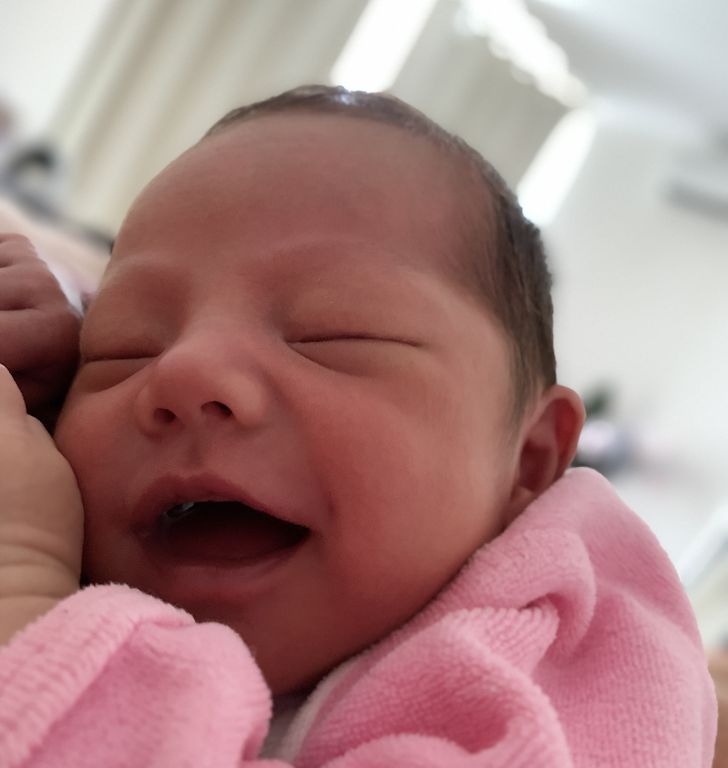
Since they cannot talk, both smiling and crying are a baby’s basic means of communication. This is, at least, true during their first moments after birth. However, you should also keep in mind that other separate sets of studies have managed to prove that babies are already social beings days or even hours after being born.
That is why their smiles can also be a response to positive feelings or soothing sensations such as a caress on the cheek or feeling clean again. Pleasant memories, like voices, aromas, and tastes can also trigger a smile on a baby.
Newborns don’t dream, but they do have memory
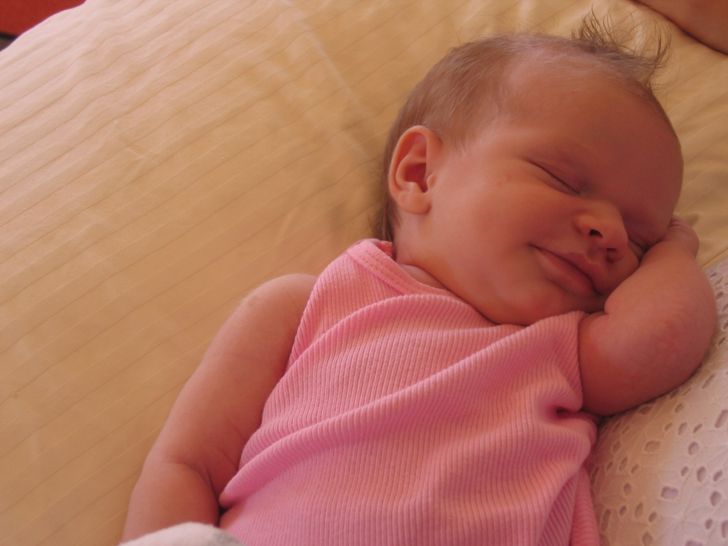
And while we look at a baby that’s sleeping soundly we also often see him or her smile, that doesn’t necessarily mean that they’re dreaming even if that seems to be the case. In fact, this is hardly possible, since a newborn baby does not yet have enough experiences to remember, nor do they have the capacity to imagine, and their brain is still growing to gain those capacities.
Sleeping in the first weeks of life has some very specific functions which include helping babies to develop their brain, process information, and consolidate memory, which does begin to take shape in the womb. The latter, in fact, can be proven by observing how babies can recognize their mother’s or father’s voice just hours after being born.
Anyway, we know well that the motive behind these smiles will never replace the feeling you get when you see them on your baby for the first time. Do you have pictures of your newborns smiling? Feel free to share them with us and fill the comments with tenderness.











